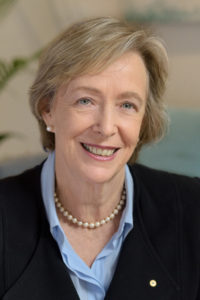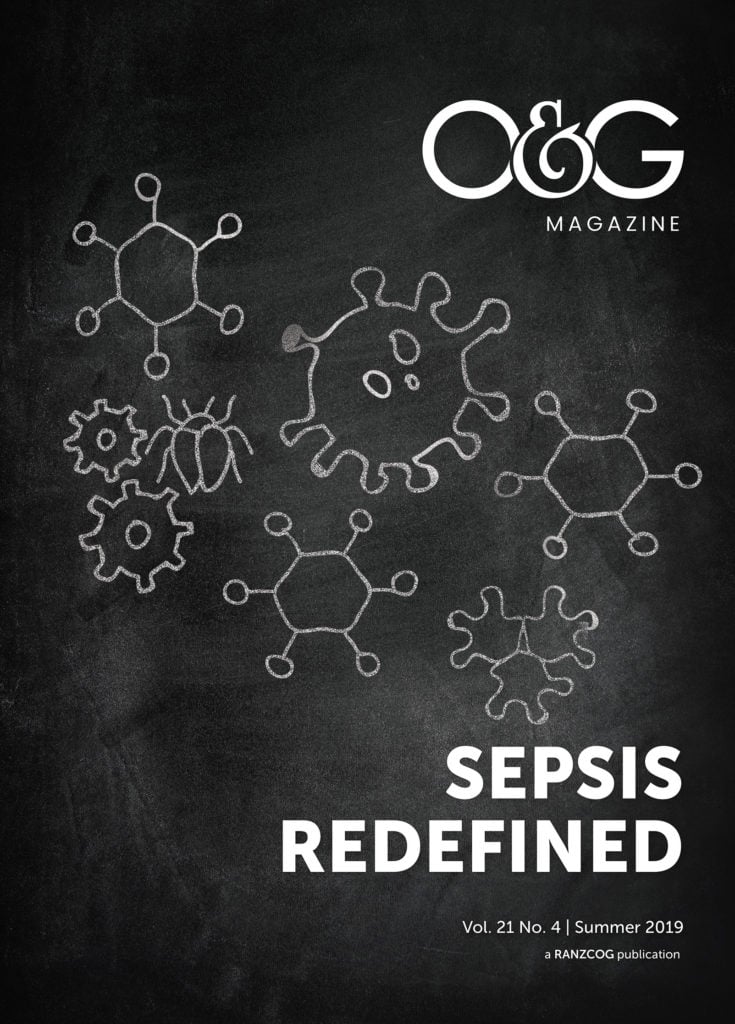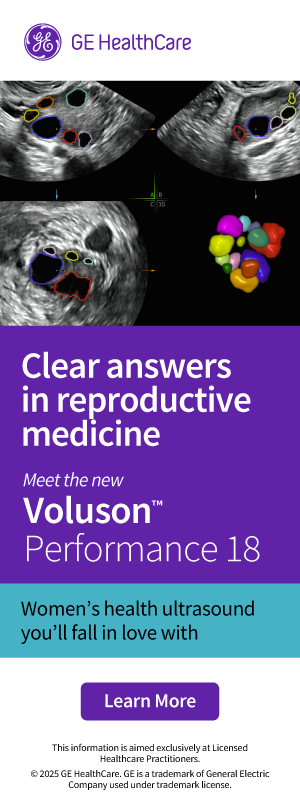This new O&G Magazine feature sees Dr Kirsten Connan in conversation with RANZCOG members in a broad range of leadership positions. We hope you find this an interesting and inspiring read. Join the conversation on Twitter #CelebratingLeadership @RANZCOG @connankf
A/Prof Christine Tippett AM
FRANZCOG
A/Prof Tippett’s entry into O&G occurred after a nine-year break from medicine, during which time she had three children, Sarah, Jonathan and Bronwyn. She now has eight grandchildren whose company she very much enjoys.
In 1981, Chris was appointed as one of three trainees in obstetrics and gynaecology at Queen Victoria Medical Centre (QVMC) in Melbourne. All three trainees appointed to QVMC that year were women, which caused much comment and some controversy. There, she excelled in her training, achieving the FJ Brown Medal in 1984 for the Royal Australian College of Obstetrics and Gynaecology examinations. She spent two years at St Mary’s Hospital in Manchester where she gained invaluable experience in the specialty. At the completion of her training, she was appointed as a specialist at QVMC and Box Hill Hospitals and commenced a solo private practice in East Melbourne. When the QVMC moved to Clayton as Monash Medical Centre in 1987, Chris joined the move and continued her role as specialist obstetrician, being appointed head of the diabetes pregnancy service. At this time, she transferred her private practice to Clayton, and further developed her interest in high-risk obstetrics and, in particular, maternal medicine in both the public and private sectors.
In 2010, she was made a Member of the Order of Australia (AM) and in 2017, a member of the Victorian Honour Roll of Women.
In 2018, Chris was elected Honorary Treasurer of the International Federation of Obstetrics and Gynecology (FIGO) and is enjoying making a contribution to the international community.
Chris was both the first, and today remains the only, female RANZCOG President (2006–2008). I had the pleasure of interviewing Chris about her career at College House, where her Presidential photo is on view.

What words best describe your life?
Rewarding and fortunate!
Who has been the greatest influence in your life?
My mother. She was an amazing lady and an outstanding role model for me. I would describe her as an early feminist and a woman who strongly believed that women could and should be able to do whatever they wanted. Although I was often told by others that medicine was not a career for a woman, I cannot recall either she or my father ever questioning my decision.
Do you see yourself as a leader?
That is a difficult question to answer. I have held a number of leadership positions during which time I have worked with many people to drive change and set high standards with the aim of improving the healthcare that we provide for women.
Why did you choose to specialise in O&G?
I loved both medicine and surgery and it seemed liked the perfect combination of both. It was a fortunate choice as I cannot think of any other specialty that I would have preferred.
What have been your proudest leadership roles?
Being the RANZCOG President was a great privilege. During my presidency, I persuaded my colleagues to support me in holding the first Indigenous Women’s Meeting in Darwin. It was extraordinarily successful and I am delighted that has led to RANZCOG having a greater focus on Indigenous women’s health. I represented RANZCOG at the Senate enquiry which led to the removal of RU486 from the ‘restricted list’ and was very involved in Victoria’s abortion law reform. At Monash Medical Centre, I established the maternal-fetal medicine unit, and as I approach retirement, it is very rewarding to see it going from strength to strength.
Was your pathway to RANZCOG Presidency planned?
No, not at all! I’ve always loved being involved in clinical medicine, as well as hospital and College committees. The opportunity arose after a period of time on RANZCOG Council. I had great support from a number of councillors, as well as many of my senior colleagues at Monash Medical Centre. The role wasn’t always easy and there were some individuals who found having a female as president challenging, but it was an amazing platform to engage with College members and provide advocacy for women’s health in Australia and New Zealand.
What do you see as the greatest challenges with a career in O&G?
I’ve loved my career and I have no regrets doing obstetrics and gynaecology, but it’s a demanding specialty, particularly obstetrics. The hours can be pretty terrible and the emotional toll very real. Having supportive colleagues with whom one can discuss problems and who understand the challenges is immensely important.
Did you see your gender as a barrier to your career?
No, but it did present some challenges. I was certainly aware I was a ‘woman in a man’s world’, and that it was important to contribute to discussion and ensure I was considered for different roles and committees. Sometimes there was surprise that I really was a specialist and from time to time hostility, but I was determined to be good at what I did and be judged for my performance rather than my gender. Although it is undeniable, there remain challenges for women. However, the progress that has been made during my professional career is extraordinary and I have no doubt the equality for which we strive will be achieved.
Do you feel ‘we’ are heading in the right direction?
One of our aims is to ensure we contribute to ensuring all women have access to the highest standards of healthcare and that their autonomy is respected. A diverse and well-trained workforce is pivotal in achieving this goal. I hope, over time, we will achieve a better gender balance in the training program so we can maintain gender diversity with the advantages it brings. I also hope that more women will come forward to contribute to the College work and, in time, be prepared to stand for leadership roles.
What do you see as current challenges for trainees?
Overwhelmingly, this must be the reduced working hours and the increased trainee numbers. Although this has created improved work-life balance, it has dramatically reduced opportunities for learning, experience and procedural skills. I’d encourage trainees not to rush through their training years and look for opportunities, both here and abroad, to gain more experience and to ensure that when they have completed their training they have confidence in their skills. Part-time and interrupted training has been a great initiative strongly supported by our College; however, there is no doubt it can negatively impact on training and it is important trainees understand and recognise this when they are planning their training time.
Are you willing to be contacted for career advice?
I think the best mentoring relationships grow organically, but I’m certainly very willing to talk about my experience and provide advice on a career in high-risk obstetrics and College activities.
Do you have any regrets in your career?
We can always reflect and learn from previous mistakes, but I have few regrets. If anything, I wish I had time to take on more roles and participate in more research! I have had a privileged, fortunate and rewarding career, and on refection, I’m surprised about where my decision to go back to work in 1981 has led me.
Author’s Note
I thank A/Prof Tippett for her time and insightful comments. She interrupted her beach holiday specifically for this interview, a reflection of her commitment to inspiring future generations in our specialty.
It has been a huge privilege to be able to share the stories of emerging and established leaders in our amazing profession over the last 12 months. During this time, we have had leaders from almost every state and territory, and from general and subspecialty members. We are looking forward to covering our final state (my home state of Tasmania) and the South Island of New Zealand in 2020. We are also looking forward to bringing you interviews from our Diplomate members and federal councillors.
I am delighted to announce that Victorian councillor, Dr Nisha Knot, will be bringing you our Leaders In Focus column in 2020.
Thank you to those who kindly contributed to interviews in 2019. I am truly delighted to finish this year’s Leaders In Focus column with RANZCOG’s first and only female past President and Hon. Treasurer for FIGO, A/Prof Christine Tippett.
– Dr Kirsten Connan






Heather Munro was the first female president of the RACOG and was involved in the amalgamation of the Australian and New Zealand colleges
I can’t remember whether the colleges amalgamated whilst she was president- if so she was the first female president of the RANZCOG